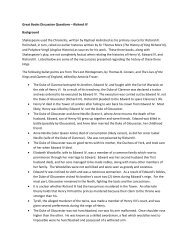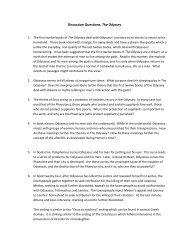1 Wordsworth's Literary Precedents: Derivation and ... - Peter Ponzio
1 Wordsworth's Literary Precedents: Derivation and ... - Peter Ponzio
1 Wordsworth's Literary Precedents: Derivation and ... - Peter Ponzio
Create successful ePaper yourself
Turn your PDF publications into a flip-book with our unique Google optimized e-Paper software.
Johnson had specific ideas on the use of natural settings in poetry, <strong>and</strong><br />
commented that Milton, in The Paradise Lost, does not evoke a true view of nature: “But<br />
his images <strong>and</strong> descriptions of the scenes or operations of Nature do not seem to be<br />
always copied from original form, nor have the freshness, raciness, <strong>and</strong> energy of<br />
immediate observation. He saw Nature, as Dryden expresses it, through the spectacle of<br />
books; <strong>and</strong> on most occasions calls learning to his assistance” (123). This comment by<br />
Johnson lends credence to Wordsworth’s criticism of Neo-Classical poets as being more<br />
concerned with form, <strong>and</strong> less concerned with substance <strong>and</strong> feeling in poetry. As<br />
Wordsworth maintains in his theory of poetry, the poet uses images of nature to impart<br />
feeling <strong>and</strong> sensation to his reader.<br />
Johnson, like Wordsworth, believed that poetry should be more than mere<br />
pleasure, that it should impart a moral quality to the reader, as well. Johnson states that<br />
the first work of the poet “is to find a moral, which his fable is afterwards to illustrate <strong>and</strong><br />
establish. … To convey this moral, there must be a fable, a narration artfully constructed,<br />
so as to excite curiosity, <strong>and</strong> surprise expectation” (118). Johnson, in a later passage,<br />
talks about the requirement for a moral purpose in poetry, while at the same time<br />
discussing the task of the poet to combine the elements of a poem in an harmonious<br />
whole<br />
which he must improve <strong>and</strong> exalt by a nobler art, must animate by dramatic<br />
energy, <strong>and</strong> diversify by retrospection <strong>and</strong> anticipation; morality must teach him<br />
the exact bounds, <strong>and</strong> different shades, of vice <strong>and</strong> virtue; from policy, <strong>and</strong> the<br />
practice of life, he has to learn the discriminations of character, <strong>and</strong> the tendency<br />
of the passions, either single or combined; <strong>and</strong> physiology must supply him with<br />
illustrations <strong>and</strong> images. To put these materials to poetical use, is required an<br />
imagination capable of painting nature, <strong>and</strong> realizing fiction. Nor is he yet a poet<br />
till he has attained the whole extension of his language, distinguished all the<br />
delicacies of phrase, <strong>and</strong> all the colours of words, <strong>and</strong> learned to adjust their<br />
8




